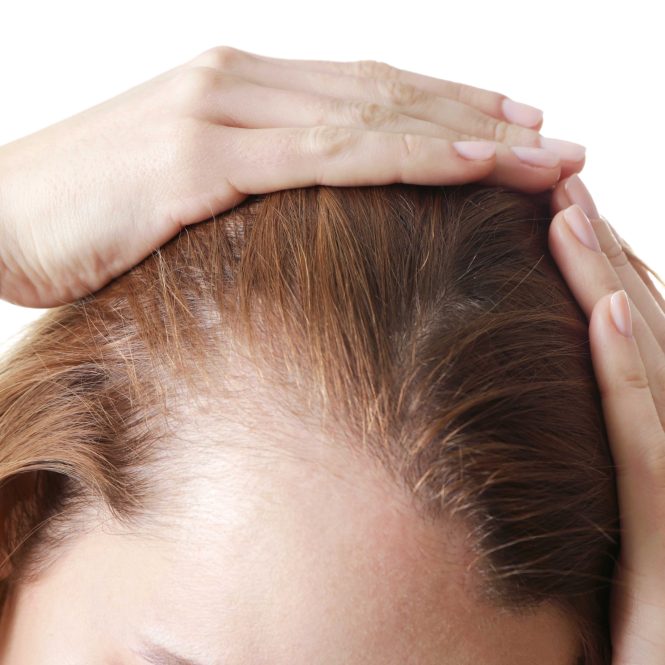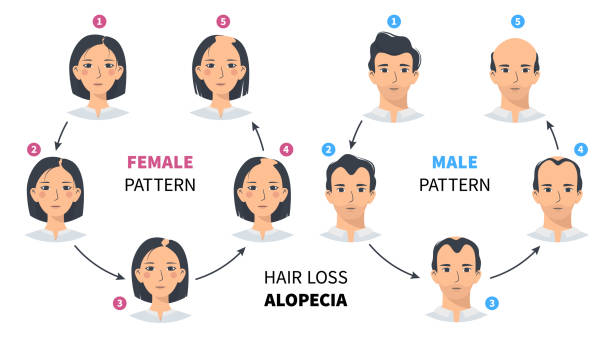

Hair loss in women is a common concern, impacting self-esteem and overall well-being. This comprehensive guide delves into the intricate factors contributing to female hair loss and explores a range of effective treatments. From hormonal fluctuations to genetic predispositions, we’ll uncover the root causes and equip you with practical strategies to manage and potentially reverse hair loss. This article will detail various causes, symptoms, and tailored treatment options available for women experiencing hair loss issues, ultimately aiming to empower you with the knowledge and tools to achieve healthier, fuller hair.
Understanding the Multifaceted Nature of Hair Loss in Women
Hair loss, or alopecia, can affect women of all ages and backgrounds. It’s a distressing condition that can significantly impact self-image and overall well-being. While often associated with male pattern baldness, female hair loss is a complex issue with its own set of unique causes and treatment approaches. Understanding these intricate factors is key to effective management and ultimately regaining healthy hair.
Common Causes of Hair Loss in Women
Female hair loss is rarely caused by a single factor but rather a combination of genetic, hormonal, and environmental influences. Some prevalent causes include:
- Genetic Predisposition: A family history of hair loss can increase a woman’s risk of experiencing thinning or balding.
- Hormonal Fluctuations: Fluctuations in hormones, particularly during pregnancy, childbirth, or menopause, can trigger hair loss.
- Stress and Anxiety: Severe stress and anxiety can contribute to hair loss by triggering a temporary shedding phase.
- Nutritional Deficiencies: Insufficient intake of essential nutrients like protein, iron, and vitamins can lead to hair thinning.
- Medical Conditions: Underlying medical conditions, including thyroid disorders or autoimmune diseases, can sometimes contribute to hair loss.
The Impact on Women’s Well-being
Beyond the physical manifestation, hair loss in women can have a significant psychological impact. Low self-esteem, anxiety, and depression can stem from the perceived change in appearance.
Hormonal Influences on Hair Loss in Women
Hormonal fluctuations play a significant role in female hair loss, particularly in women experiencing significant hormonal changes. Understanding these interactions is key to implementing appropriate preventative measures and targeted treatments.
Hormonal Imbalances and Hair Loss
Various hormonal changes throughout a woman’s life can disrupt hair growth cycles, leading to noticeable hair loss. For instance, hormonal imbalances related to conditions like polycystic ovary syndrome (PCOS) can often lead to noticeable thinning in women. These hormonal changes directly affect hair follicle function. Sometimes, these changes can manifest in different patterns of hair loss in women.
Pregnancy and Postpartum Hair Loss
Pregnancy often results in a temporary thickening of the hair due to hormonal changes. However, after childbirth, these levels often decrease, resulting in noticeable hair loss. This temporary phenomenon, known as postpartum hair loss, is a natural consequence of hormonal shifts, typically resolving within a few months.
Menopause and Hair Loss
Menopause is a pivotal stage in a woman’s life, often accompanied by significant hormonal changes. This can affect the hair growth cycle, potentially triggering hair loss and thinning. In addition to hormonal changes, lifestyle factors like diet and stress can also influence the severity of hair loss during menopause.
Genetic Predisposition and Hair Loss Patterns
Genetics plays a significant role in how our hair behaves. Androgenetic alopecia, a genetic condition, can affect both men and women and manifests differently in women. It’s characterized by diffuse thinning, which can be more noticeable over time.
Female Pattern Hair Loss: What to Know
The hair loss experienced in women, often referred to as female pattern hair loss, differs from male pattern baldness. It typically involves a more diffuse thinning across the scalp rather than a receding hairline.
Understanding Genetic Factors
A family history of hair loss can increase an individual’s susceptibility to experiencing hair loss patterns. Understanding this connection is vital for developing proactive strategies.
Lifestyle Factors and Hair Loss
Several lifestyle choices can significantly impact hair health. This section explores the relationship between lifestyle and hair loss.
Stress and Its Impact on Hair
Chronic stress can disrupt the natural hair growth cycle, potentially leading to temporary hair loss. Stress hormones can affect the hair follicle’s ability to produce healthy hair.
Nutritional Deficiencies and Hair Health
A balanced diet rich in essential nutrients is crucial for hair health. Nutritional deficiencies, such as those in protein, iron, or vitamins, can impede hair growth. Deficiencies can lead to thinning hair, dullness, and breakage.
Treatment Options for Hair Loss in Women
Fortunately, several treatment options exist for managing and potentially reversing hair loss in women. This section explores diverse approaches.
Medical Interventions and Therapies
Consulting a dermatologist is crucial for a personalized approach to managing hair loss. Treatments may involve oral medications to address hormonal imbalances or scalp conditions. Hair growth supplements and topical solutions are additional options. It is important to remember that no single treatment is suitable for everyone; professional guidance is essential.
Lifestyle Modifications and Home Remedies
Lifestyle adjustments can significantly contribute to hair health. A balanced diet, stress management techniques, and avoidance of harsh hair products can play a key role. Nutritional supplements and scalp massages can support healthy hair growth as well.
In conclusion, understanding hair loss in women requires a multifaceted approach. Addressing the root causes, whether hormonal, genetic, or lifestyle-related, is crucial. This comprehensive guide has explored various treatment options, from lifestyle modifications to medical interventions. For personalized advice and effective management, consult a dermatologist or healthcare professional specializing in hair loss. They can perform a thorough evaluation, identify the underlying factors, and recommend the most appropriate treatment plan to help you achieve healthy hair growth and overall well-being.